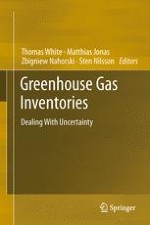2011 | OriginalPaper | Buchkapitel
Benefits of dealing with uncertainty in greenhouse gas inventories: introduction
verfasst von : Matthias Jonas, Gregg Marland, Wilfried Winiwarter, Thomas White, Zbigniew Nahorski, Rostyslav Bun, Sten Nilsson
Erschienen in: Greenhouse Gas Inventories
Verlag: Springer Netherlands
Aktivieren Sie unsere intelligente Suche, um passende Fachinhalte oder Patente zu finden.
Wählen Sie Textabschnitte aus um mit Künstlicher Intelligenz passenden Patente zu finden. powered by
Markieren Sie Textabschnitte, um KI-gestützt weitere passende Inhalte zu finden. powered by
The assessment of greenhouse gases emitted to and removed from the atmosphere is high on the international political and scientific agendas. Growing international concern and cooperation regarding the climate change problem have increased the need for policy-oriented solutions to the issue of uncertainty in, and related to, inventories of greenhouse gas (GHG) emissions. The approaches to addressing uncertainty discussed in this Special Issue reflect attempts to improve national inventories, not only for their own sake but also from a wider, systems analytical perspective—a perspective that seeks to strengthen the usefulness of national inventories under a compliance and/or global monitoring and reporting framework. These approaches demonstrate the benefits of including inventory uncertainty in policy analyses. The authors of the contributed papers show that considering uncertainty helps avoid situations that can, for example, create a false sense of certainty or lead to invalid views of subsystems. This may eventually prevent related errors from showing up in analyses. However, considering uncertainty does not come for free. Proper treatment of uncertainty is costly and demanding because it forces us to make the step from “simple to complex” and only then to discuss potential simplifications. Finally, comprehensive treatment of uncertainty does not offer policymakers quick and easy solutions. The authors of the papers in this Special Issue do, however, agree that uncertainty analysis must be a key component of national GHG inventory analysis. Uncertainty analysis helps to provide a greater understanding and better science helps us to reduce and deal with uncertainty. By recognizing the importance of identifying and quantifying uncertainties, great strides can be made in ongoing discussions regarding GHG inventories and accounting for climate change. The 17 papers in this Special Issue deal with many aspects of analyzing and dealing with uncertainty in emissions estimates.
